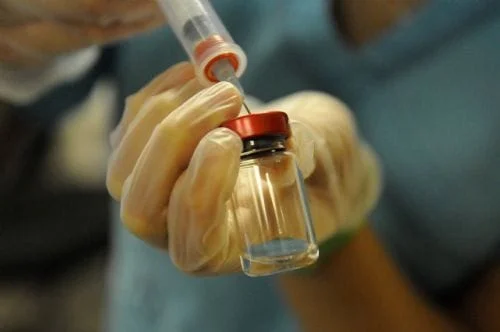How is immunotherapy different from other types of allergy treatment?
Immunotherapy is a process that trains the immune system to build a tolerance to allergens (ignore their presence) over time. It is the only treatment available that actually reduces an allergic person's sensitivity to allergy triggers. Unlike medications, which suppress symptoms but do not stop the underlying allergic reaction, immunotherapy builds immunity that counteracts and reduces the allergic reaction itself. It is therefore a more "natural" solution to the allergy problem. In a sense, allergy shots are like a continuous vaccine protecting the body from airborne allergic triggers.

A distinct advantage of this type of preventive treatment is that there is a lasting benefit, even long after immunotherapy has been stopped. This is unlike anything else used for the treatment of allergies at this time. For example, though medications can reduce symptoms, once the medications are stopped, the symptoms return. On the other hand, immunotherapy builds a tolerance that often remains for years after stopping shots.
How is immunotherapy different from other types of allergy treatment?
Immunotherapy is a process that trains the immune system to build a tolerance to allergens (ignore their presence) over time. It is the only treatment available that actually reduces an allergic person's sensitivity to allergy triggers. Unlike medications, which suppress symptoms but do not stop the underlying allergic reaction, immunotherapy builds immunity that counteracts and reduces the allergic reaction itself. It is, therefore, a more "natural" solution to the allergy problem. In a sense, allergy shots are like a continuous vaccine protecting the body from airborne allergic triggers.
A distinct advantage of this type of preventive treatment is that there is a lasting benefit, even long after immunotherapy has been stopped. This is unlike anything else used for the treatment of allergies at this time. For example, though medications can reduce symptoms, once the medications are stopped, the symptoms return. On the other hand, immunotherapy builds a tolerance that often remains for years after stopping shots.
How does immunotherapy work?
Immunotherapy involves giving gradually increasing doses of allergy serum (a mixture of allergens the patient is sensitive to) causing the immune system to become less sensitive to the triggers. By "overdosing" the body with allergens in a controlled way, the immune system is fooled; "blocking" antibodies are formed that effectively prevent allergic responses from occurring when these same allergic triggers are later encountered. Other parts of the immune system, such as the ability to fight infection, are not affected.
How quickly could I see results?
During the initial build-up phase, you will likely still need medications to supplement your immunotherapy and control the symptoms. But once the doses reach maintenance levels, which are the highest dose that you will receive, you may begin to find that you are no longer as dependent on medications. Your physician will check on your progress periodically and adjust your immunotherapy dosing if necessary, as well as advise you on whether you are ready to try weaning off some of your medications. This could happen as early as a few months into immunotherapy.
How will the decision be made regarding the length of treatment?
Each individual is unique; however, in general, the longer the course of allergen immunotherapy, the less likely there will be a relapse of allergy symptoms when the shots are stopped. Most patients are able to achieve lifelong immunity that blocks their allergic sensitivities after about a 5-year course of monthly maintenance injections. A gradual "weaning" off of immunotherapy may be helpful in determining whether you are ready to completely discontinue your injections.

What needs to happen prior to starting immunotherapy?
Before starting treatment, the physician and patient identify the target list of allergic triggers. Skin tests are performed to confirm these specific allergens. Immunotherapy is usually recommended if the person is found to be sensitive to several allergens that are difficult to avoid, such as multiple pollens and environmental allergens, or if symptoms are severe enough to require chronic use of medications to get relief. Often an allergic patient is able to reduce or eliminate medications once immunotherapy has reached maintenance doses.
Immunotherapy for asthma
Immunotherapy is effective in the treatment of allergic asthma. Allergy shots can help relieve the allergic reactions that trigger asthma episodes, thereby enhancing airflow in the lungs and decreasing the need for both daily and rescue asthma medications.

How do allergy shots work?
An extract of a small amount of the allergen is injected into the soft tissue on the back of the arm. Patients are asked to wait in the office for 30 minutes to observe for possible reactions. Though severe systemic reactions are rare during carefully monitored immunotherapy (less than 1% incidence), it is crucial that if such a reaction occurs, immediate medical treatment is available. Most such reactions would occur within 30 minutes after receiving an immunotherapy injection and can be safely treated in the office. After this 30 minute waiting period, the patient returns to the nurses' station where an "arm check" takes place (any local swelling or redness is noted in the record and the dose for the next shot is adjusted accordingly).
Dosing Schedule
Allergy injections are given twice a week for approximately the first 3 months, after which injections can be administered once a week for 10 weeks, every other week for 10 weeks, every three weeks for 10 weeks, and then once a month (maintenance) for a total of 4 - 5 years.
Risks
The main risk of allergen immunotherapy is a systemic allergic reaction to the extracts used in treatment (they contain precisely the substances to which the patient is allergic). For this reason, shots must be administered under supervision by trained staff and with emergency treatment immediately available. Most of the time, there is no reaction at all, since we are advancing doses cautiously and giving the body a chance to gradually build a tolerance.
The most common reaction consists of a localized swelling at the injection site, similar to a mosquito bite. However, there is a small (less than 1%) chance of a more severe reaction, up to and including anaphylactic shock, shortly after an injection. Other systemic symptoms such as hives, swelling of the lips or eyelids, wheezing or other breathing problems may also rarely occur. This can happen even after months or years of treatment without a reaction, so it is important to always remain at the office for at least 30 minutes after your injection. We have emergency medications and trained personnel available in the office during all shot hours in case of a severe reaction.
It is very important to tell the nurse who administers your allergy shot the size and location of your last allergy shot reaction. A dosage adjustment can then be made if necessary, helping prevent your reactions from increasing in severity.

Bringing immunotherapy to a safe and happy conclusion
While at first glance it may seem that 4-5 years of monthly allergy shots is a long time to continue therapy, remember that this is likely to replace decades of medication required to control symptoms! If you are severely allergic to grass pollen or dust mites in particular, the improvement from allergen immunotherapy is the most dramatic and often eliminates the need for daily medications.
After you can tolerate being off of medications without major symptoms for at least a year, your doctor may decide to try weaning your immunotherapy injections to longer intervals as a trial, or may advise discontinuation. There is a small rate of relapse after many years; in such cases, immunotherapy may be safely repeated and often is effective much more quickly the second time around. The vast majority of patients will be able to successfully wean off immunotherapy without any relapse, however, and with a marked reduction in the need for medications, go on to live a healthy and allergy symptom-free life.
